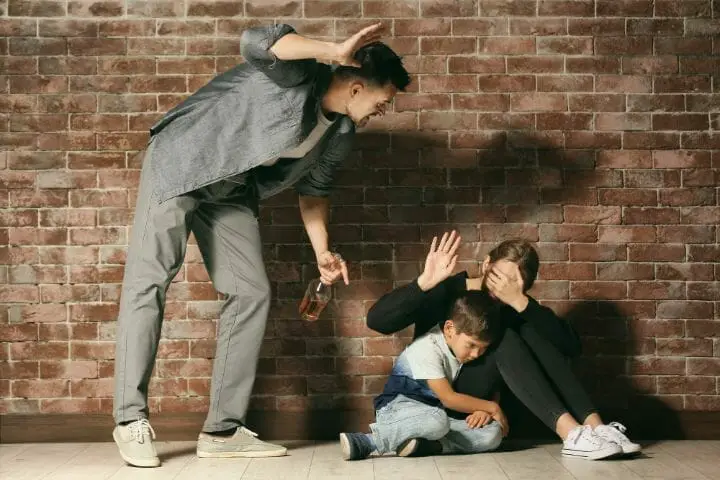Consider our lives as a cycle with a beginning and an end. As people age, they become fragile and lose some of their capacity and strength. At that time, they need help and care from others. Most of the time, children of these individuals provide the care they need.
However, what if these seniors abused their children when they were growing up. How difficult would it be for these children to provide the care then? What are the challenges and the dilemma these grownup children face? Let’s try to understand various facets of this complex topic.
Contents
Intro
I had a friend – a well-mannered, graceful, kind young woman. She was there to help anybody and everybody at work or in personal life. So, when she told me about her father, who was not doing very well. My first thought was that a person like her would do anything she can to care for her father.
However, I was surprised when she shared that she plans to put her father in a long-term care home. I could not understand why a person who goes out of the way to help everybody does not feel very emotional about her father. I asked her if her father had any special needs that can only be taken care of in long term care homes.
She denied and said she is not very attached to her father. I was intrigued because this lady was the most emotional person I knew. As the conversation went on, I realized her relationship with her father was not the same as most other children have with their parents.
Most of us will think her experience was unusual. After all, parents are there to love and care. How can one not have a cordial relationship with them? With that logic, we may expect every child to provide care for their parents in their old age.
However, it is not a utopian world, and relationships between a parent and a child may go sour for many reasons. One of the reasons behind this is abusive parents. It is where things become a little complex.
So, the question is, how can a grownup child provide care for her elderly parents who were abusive towards them in childhood. Also, it is a dilemma for grownup children. Can these abused adults forget what happened to them in the past and become selfless in caring for her parents?
In this article, we intend to help you dig deeper and find answers to these questions.
Care for the Elderly
Let’s consider typical cases when children and parents had cordial relationships throughout life. Suppose one or both of your parents are old and in need of senior care. It may be a good idea to think of it as a cycle with a beginning and an end.
As human beings age, they become fragile and lose some of their capacity and strength. It happens with everybody unless somebody has a premature death. So, when we have an opportunity to care for our parents, it may start a new cycle with our children, giving them life lessons to care for seniors.
However, while being kind and caring, we must also be realistic. Sometimes, our life situation may not allow a hands-on approach to caring for seniors. In that case, we shall try to figure out what we can do best.
The questions you may face are – can you bring the elderly parent into your home? Is it possible logistically and emotionally? When answering these questions, also consider how your spouse and children’s lives may change once your parent moves in with you.
Also, there may be situations when either because of the elderly’s health needs or your family conditions, it is impossible to provide hands-on care at home. In those cases, you should try not to get into a sense of guilt.
It would help if you considered the positives and negatives of putting the elderly senior in a long-term senior care facility. You may conclude that the elderly may get better round the clock care in the care home than he would get at your home.
It is still easier to decide among various options you have if your relationship with your parent was without any conflict and mostly cordial. However, let’s understand the process if the parent did not treat the person very well in her childhood. Or in a few cases, the parent even abused the child.
You may also like How to Help Elderly Parents From a Distance?
Childhood Abuse by Parents
Most of the time, we may romanticize the relationship between children and their parents. Also, when death comes around, the general perception is that coming to peace with an abusive parent may lead to reconciliation.
However, you cannot come to peace with a person who does not admit that they did anything wrong. They cannot accept the terrible things that they inflicted on their own child.
Nevertheless, some people make peace with their abusive parents, but that does not mean there will ever be a healthy relationship between them. Many of the abusers do not feel guilt. They may feel the world has cheated them and owe an apology to them.
Moreover, they may even think that their children let them down. These seniors may not be able to see that their children did everything they could do. Continuously abused psychologically and physically, these children grow up with hatred towards their parents.
Few childhood abuse survivors choose to distance themselves from their abusers. They face judgment from relatives and friends who do not know the effects of the abuse these adult children were subjected to by their parents. These friends and relatives may even insist that nothing matters more than the family ties regardless of the kind of abuse.
The situation may become even more problematic when out of many children, only one child was abused. It may happen because of the level of expectations parents’ may have from their children, and one child was not ready to carry the burden of their expectations.
I have also come across a few cases where a narcissistic parent is well-known and an achiever in public opinion. It is only the spouse, and the children of that person know the reality. Outsiders who only see the person for a few minutes or hours always think that he must be an ideal parent.
You may also like Helping Seniors with Finances – How Can I Protect My Elderly Parents Money?
Recognize the Roots of Abuse
While understanding the root cause of the parent’s abusive behavior is crucial, it is not very easy. These reasons may vary a lot from case to case.
After speaking with a few of my psychologist friends, I realize that abuse is often a family ailment. Like any hereditary disease, it is passed through generations until one generation decides to stop it.
So, you may find that your parents have also been raised by imperfect people who didn’t treat them well. As a result, they provided the same care to you as they got, even if it was abusive. While this reasoning does not make abuse right, a deeper understanding of their past may help you make progress in your healing.
On the other hand, the root cause of a parent’s abusive behavior could also lie in untreated psychological issues or a decline in cognitive capabilities at a young age.
These may result from underlying medical conditions such as alcohol consumption, drug consumption, or neural disorders. They may also be suffering from occasional memory loss or a limited ability to distinguish fantasy from reality.
In these scenarios, as the brain’s neuron connections deteriorate, it may result in extreme emotions. Sometimes, the same people, who are gentle in general, may become argumentative, stubborn, and abusive.
What if an Abusive Parent Needs Care?
Fast forward to the present when childhood is gone, and the abusive parent needs care. Countless adult children who were abused by their parents grapple with the dilemma – whether they should provide care to their elderly parents who mistreated them. They also find themselves in a quandary as they can see that society expects them to provide care for their parents.
Sometimes adults decide to avoid repeating any of their parents’ mistakes and choices with their own family. For that, they also choose to forgive their parents.
It becomes easier if an abusive parent acknowledges his mistakes and regrets where he fell short. If it happens, children may form a new bond with the parent.
On the other hand, few people may follow strong religious beliefs. They decide to be good to their parents regardless of the kind of childhood they endured. These adult children choose to assume responsibility for an abusive parent’s care.
In all those cases, as the parent ages and shows signs of needing more care, the same child who was abused in childhood can find herself capable of caring for the parent in a “hands-on” capacity.
However, regardless of the reason behind their decision, these adult children should be aware of their boundaries and keep their emotional balance. It has been observed that caregivers who provide hands-on care for their abusive parents are more likely to show clinical depression signs.
In other cases, deeply ingrained issues between an abusive parent and his grownup child remain unresolved. It may happen because the parent never admits that he was abusive towards the child.
So, even if the child is willing to work towards emotional healing, the parent may deny that opportunity vehemently. It means that even though the childhood abuse was over, the emotional abuse is continuing.
These are the situations when children have a dilemma in front of them. It is not easy to decide what they should do when the same abusive elderly parent needs care and help. They keep wondering if it is possible to overcome their feelings of deeply ingrained resentment.
In the end, they may feel that they are not emotionally ready to provide the physical care their aging parents need. They may not be sure of getting involved in the care of an abusive parent.
Nevertheless, if you are one of those grownup children, you may feel terrible and do not know your options. You may not understand why you carry the guilt for not caring for a parent even though you know that person was nothing but a destructive force in your life.
On top of that, your dilemma may aggravate when you read moving stories of children coming together and caring for an elderly parent. It is natural to feel disconnected as you wonder why you did not have a mutual feeling of love and devotion for each other. You miss the motivation you may need to provide support and care for your elderly.
It is a double whammy for these grownup children. On the one hand, parental abuse in their childhood made them feel left out. On the other hand, the romantic narrative of loving and caring parents and families makes you feel the same again – left out.
If you are in the same situation – struggling with caregiving decisions for an elderly with a complicated past – you are not alone.
You may also like Causes of Agitation in Elderly
Caring Options for an Abusive Elderly
Taking care of an abusive elderly is a challenging task with limited options, especially in current times of COVID-19. The pandemic may have made things even more difficult for abused grownups because they know that long-term senior care homes are the hub of the virus infection.
Anyway, there are few things one can do when facing this dilemma of caring for an abusive elderly:
- Acknowledge the past, as it brings emotional well-being and helps you handle interpersonal challenges with dignity and grace.
- You may also seek therapy with a well-trained counselor. When you work through your feelings, you may find a more active role in caregiving. It may also help you put your priorities in perspective and validate your decision concerning caring for your elderly.
Counseling and support can provide validation, encouragement, and problem-solving strategies.
- Now Suppose, you have done everything you can to provide care to your abusive parent. But still, you cannot find peace. It is time you may consider outsourcing as an option.
You may hire a geriatric care manager. Although expensive, they may ensure that the older adult gets the care they require. They can act as a buffer between you and your parent.
- You may have another hands-off option if your parent is legally incompetent. He may require someone else to take care of their health, living situation, and finances. Here, hiring a legal guardian can be an excellent hands-off approach.
After evaluating all of the above options, if you decide to provide personal home care to your elderly, you may want to do the following things to improve the caregiving experience:
- Engage with community resources to exchange ideas.
- Talk to others in your family and friends’ circle, and share your feelings about what you are going through.
- Accept that your parent may not change, or even they cannot change. They may still abuse you emotionally or even physically. So be ready for those situations.
- Any argument or retaliation from your side may not lead to anywhere, so try your best to avoid that.
- Try to use positive language with your parents. They may or may not recognize your efforts, but you will still feel better.
- Keep a tab on your own mental conditions and understand your limitations.
- Distract yourself by embracing other better things in your life, even if they are few and far between
Saying NO to Caregiving
Even though you accept that your parents are human and they may have incurred some trauma of their own. Still, you were not responsible for their difficulties or happiness.
With that in mind, saying no to providing caregiving may also be an option. Every person is free to set her boundaries and decide that one cannot get involved with a toxic parent’s care. This choice may not be easy to accept or execute. You may have to be ready to change your mind if your decision does not give the right result.
While providing care and helping your elderly but abusive parent may display magnanimity from your side, it should not be at the cost of your own health.
Regardless of what you decide, it would be best if you prioritized your own physical and mental health over anything else. While it may be difficult, try to get rid of the guilt, disregard popular judgments, and ignore expectations that society may attribute to you. In the end, it is your soul searching, which can help you find the answer that may be best for you.
You may also like Tired of Caring for Elderly Parents? Make them independent, they will love you for it.
What if the Abuse Continues?
If you are reading until this point, I am sure you are incredibly committed to doing your best. However, you may wonder what you can do if you realize that the abuse continues even when you provide the care.
There are many cases when the elderly continue to abuse their caregivers. In these cases, the caregiving experience can transition from being uncomfortable to being dangerous.
When parents are angry, insensitive, and controlling, the caregiver’s emotional and physical well-being is at risk. These elders may use several types of abuse tactics, such as:
- Excessive demands
- Continuous yelling and shouting
- Lying and accusing falsely
While these tactics may become visible to others, caregivers may be subjected to other subtle types of abuse tactics such as manipulation, inducing guilt, and shaming.
So being aware of these tactics and possible settings will help the caregiver avoid them. It would also help if you keep other family members in the loop, so you alone don’t go through the emotional rollercoaster ride.
Also, keep the option of medical intervention if abuse poses an imminent life-threatening danger to you or the elderly. It may happen if you think that the parent may harm you or himself.
Many experts recommend practicing compassionate detachment. It not only permits you to protect yourself but also makes it easier to give up the burden of your parent’s irresponsible choices. Again, as you let go of emotional involvement, you may avoid acting out of any insecurity or fear.
You may also try not to enable abuse or respond to the elderly’s abusive tactics. It may compel abusers to change their behavior as they realize that there is no effect on you. However, you may experience the elderly becoming even more aggressive as they try to take control by eliciting a harsher reaction from you.
So in those cases, if possible, try to remove yourself from their influence. Don’t ever think that taking care of yourself is selfish.
Sometimes it helps if you share with your abusive elderly that you may compel to outsource their care to professional caregivers if they don’t change. However, you should be ready to follow through on that if there is no change in behavior.
Though you should not expect the elderly to do something they can’t do, you should know when you can’t handle the situation alone. When you can’t escape from an abusive parent, try to minimize the negative consequences. You may engage with a qualified counselor and join a caregiver support group.
You may also like Elderly Abandoned by Family
Importance of Reconciliation
No matter what the circumstances were or are, you must be honest with yourself. You may have your own constraints, which may limit your capabilities as a caregiver. Be aware that besides the elderly, you are also responsible for taking care of your spouse and children.
Everything said and done – you may know that it may be your last chance to make peace with your abusive elderly
So, regardless of your history with your abusive elderly, try to start the healing process from within yourself. Your healing, upliftment, and comfort are in your hands up to some extent, if not all.
It may help if we realize that peace comes from our own heart, especially when you have failed to elicit any confession from your abusive parent. Sometimes your abusive parent can’t give you the peace you may be looking for. You may have to accept them just as they are, and that might be far from what you may expect.
However, suppose your positive efforts fail, and you realize it is impossible to reconcile because the elderly don’t respond to your overtures or continue his abusive tactics. In that case, you should not make yourself responsible for getting reconciliation with an abusive parent.







